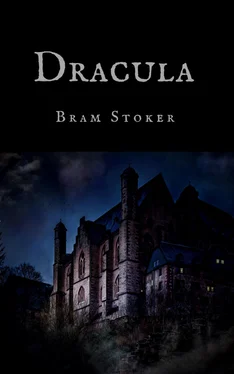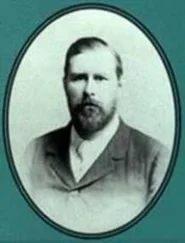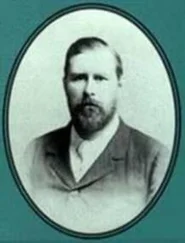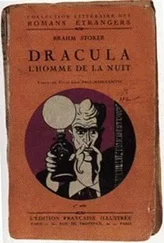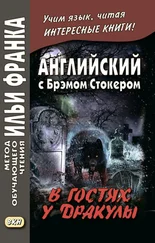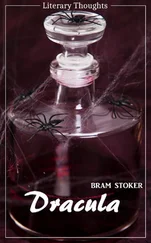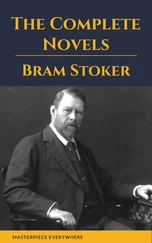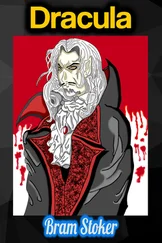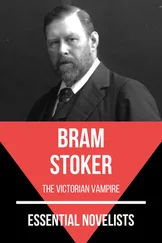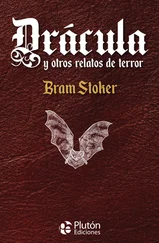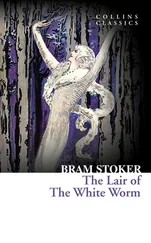I did not know what to say, but Lucy turned the conversation as she said, rising up:—
“Oh, why did you tell us of this? It is my favourite seat, and I cannot leave it; and now I find I must go on sitting over the grave of a suicide.”
“That won’t harm ye, my pretty; an’ it may make poor Geordie gladsome to have so trim a lass sittin’ on his lap. That won’t hurt ye. Why, I’ve sat here off an’ on for nigh twenty years past, an’ it hasn’t done me no harm. Don’t ye fash about them as lies under ye, or that doesn’ lie there either! It’ll be time for ye to be getting scart when ye see the tombsteans all run away with, and the place as bare as a stubble-field. There’s the clock, an’ I must gang. My service to ye, ladies!” And off he hobbled.
Lucy and I sat awhile, and it was all so beautiful before us that we took hands as we sat; and she told me all over again about Arthur and their coming marriage. That made me just a little heart-sick, for I haven’t heard from Jonathan for a whole month.
The same day. I came up here alone, for I am very sad. There was no letter for me. I hope there cannot be anything the matter with Jonathan. The clock has just struck nine. I see the lights scattered all over the town, sometimes in rows where the streets are, and sometimes singly; they run right up the Esk and die away in the curve of the valley. To my left the view is cut off by a black line of roof of the old house next the abbey. The sheep and lambs are bleating in the fields away behind me, and there is a clatter of a donkey’s hoofs up the paved road below. The band on the pier is playing a harsh waltz in good time, and further along the quay there is a Salvation Army meeting in a back street. Neither of the bands hears the other, but up here I hear and see them both. I wonder where Jonathan is and if he is thinking of me! I wish he were here.
Dr. Seward’s Diary.
5 June.—The case of Renfield grows more interesting the more I get to understand the man. He has certain qualities very largely developed; selfishness, secrecy, and purpose. I wish I could get at what is the object of the latter. He seems to have some settled scheme of his own, but what it is I do not yet know. His redeeming quality is a love of animals, though, indeed, he has such curious turns in it that I sometimes imagine he is only abnormally cruel. His pets are of odd sorts. Just now his hobby is catching flies. He has at present such a quantity that I have had myself to expostulate. To my astonishment, he did not break out into a fury, as I expected, but took the matter in simple seriousness. He thought for a moment, and then said: “May I have three days? I shall clear them away.” Of course, I said that would do. I must watch him.
18 June.—He has turned his mind now to spiders, and has got several very big fellows in a box. He keeps feeding them with his flies, and the number of the latter is becoming sensibly diminished, although he has used half his food in attracting more flies from outside to his room.
1 July.—His spiders are now becoming as great a nuisance as his flies, and to-day I told him that he must get rid of them. He looked very sad at this, so I said that he must clear out some of them, at all events. He cheerfully acquiesced in this, and I gave him the same time as before for reduction. He disgusted me much while with him, for when a horrid blow-fly, bloated with some carrion food, buzzed into the room, he caught it, held it exultantly for a few moments between his finger and thumb, and, before I knew what he was going to do, put it in his mouth and ate it. I scolded him for it, but he argued quietly that it was very good and very wholesome; that it was life, strong life, and gave life to him. This gave me an idea, or the rudiment of one. I must watch how he gets rid of his spiders. He has evidently some deep problem in his mind, for he keeps a little note-book in which he is always jotting down something. Whole pages of it are filled with masses of figures, generally single numbers added up in batches, and then the totals added in batches again, as though he were “focussing” some account, as the auditors put it.
8 July.—There is a method in his madness, and the rudimentary idea in my mind is growing. It will be a whole idea soon, and then, oh, unconscious cerebration! you will have to give the wall to your conscious brother. I kept away from my friend for a few days, so that I might notice if there were any change. Things remain as they were except that he has parted with some of his pets and got a new one. He has managed to get a sparrow, and has already partially tamed it. His means of taming is simple, for already the spiders have diminished. Those that do remain, however, are well fed, for he still brings in the flies by tempting them with his food.
19 July.—We are progressing. My friend has now a whole colony of sparrows, and his flies and spiders are almost obliterated. When I came in he ran to me and said he wanted to ask me a great favour—a very, very great favour; and as he spoke he fawned on me like a dog. I asked him what it was, and he said, with a sort of rapture in his voice and bearing:—
“A kitten, a nice little, sleek playful kitten, that I can play with, and teach, and feed—and feed—and feed!” I was not unprepared for this request, for I had noticed how his pets went on increasing in size and vivacity, but I did not care that his pretty family of tame sparrows should be wiped out in the same manner as the flies and the spiders; so I said I would see about it, and asked him if he would not rather have a cat than a kitten. His eagerness betrayed him as he answered:—
“Oh, yes, I would like a cat! I only asked for a kitten lest you should refuse me a cat. No one would refuse me a kitten, would they?” I shook my head, and said that at present I feared it would not be possible, but that I would see about it. His face fell, and I could see a warning of danger in it, for there was a sudden fierce, sidelong look which meant killing. The man is an undeveloped homicidal maniac. I shall test him with his present craving and see how it will work out; then I shall know more.
10 p. m.—I have visited him again and found him sitting in a corner brooding. When I came in he threw himself on his knees before me and implored me to let him have a cat; that his salvation depended upon it. I was firm, however, and told him that he could not have it, whereupon he went without a word, and sat down, gnawing his fingers, in the corner where I had found him. I shall see him in the morning early.
20 July.—Visited Renfield very early, before the attendant went his rounds. Found him up and humming a tune. He was spreading out his sugar, which he had saved, in the window, and was manifestly beginning his fly-catching again; and beginning it cheerfully and with a good grace. I looked around for his birds, and not seeing them, asked him where they were. He replied, without turning round, that they had all flown away. There were a few feathers about the room and on his pillow a drop of blood. I said nothing, but went and told the keeper to report to me if there were anything odd about him during the day.
11 a. m.—The attendant has just been to me to say that Renfield has been very sick and has disgorged a whole lot of feathers. “My belief is, doctor,” he said, “that he has eaten his birds, and that he just took and ate them raw!”
11 p. m.—I gave Renfield a strong opiate to-night, enough to make even him sleep, and took away his pocket-book to look at it. The thought that has been buzzing about my brain lately is complete, and the theory proved. My homicidal maniac is of a peculiar kind. I shall have to invent a new classification for him, and call him a zoöphagous (life-eating) maniac; what he desires is to absorb as many lives as he can, and he has laid himself out to achieve it in a cumulative way. He gave many flies to one spider and many spiders to one bird, and then wanted a cat to eat the many birds. What would have been his later steps? It would almost be worth while to complete the experiment. It might be done if there were only a sufficient cause. Men sneered at vivisection, and yet look at its results to-day! Why not advance science in its most difficult and vital aspect—the knowledge of the brain? Had I even the secret of one such mind—did I hold the key to the fancy of even one lunatic—I might advance my own branch of science to a pitch compared with which Burdon-Sanderson’s physiology or Ferrier’s brain-knowledge would be as nothing. If only there were a sufficient cause! I must not think too much of this, or I may be tempted; a good cause might turn the scale with me, for may not I too be of an exceptional brain, congenitally?
Читать дальше
